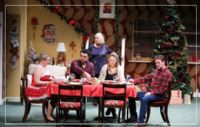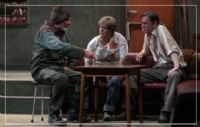REVIEW: Rigoletto
Date: 28/05/2019
Theatre Review

A cautionary tale about the dangers of love, the foolhardiness of desire and the follies of vengeance wrapped up in an admirably ambitious package, NI Opera’s production of Giuseppe Verdi’s Rigoletto, directed by Walter Sutcliffe, is a visual and aural marvel, building on the “trust and lust” theme from last year’s Cosi Fan Tutte in a more familial, close-to-the-bone, tragic manner.
Whereas Mozart wrote that “they all do it”, Verdi penned that “woman is flighty (and) changes her words and her thoughts”. That’s as discomfortingly misogynistic as you can get. But look at it in context of both the times and the production, and it all rings crystal clear.
Just as crystal clear, in an entirely different way, are the audience, their appearance certainly befitting of the “grand” in Grand Opera House. A black tie dress code is in place and just about everyone, including yours truly, is glammed up for a night that will happily look the part on the stage as well as off it.
The title character, forcefully played and sung by baritone Sebastian Cantana, is a “cursed” court jester dissatisfied with his lot. Which is immediately understandable - the jester jests for everyone else’s benefit, but not necessarily his. At the worst of times, he can be left to ponder how to make people laugh while they have absolutely no concern about how he is going to make himself laugh, or even smile.
The only shining light in Rigoletto’s life is daughter Gilda, given an exceptional, even indelible portrayal by Belarus soprano and Cardiff Singer Of The World 2015 Nadine Koutcher. With his wife’s death, Gilda is the only woman in Rigoletto’s life, and the control he maintains over her is damagingly possessive, adding extra weight to the arias Koutcher performs in Gilda’s bedroom. The different shades of pink in her pyjamas and wallpaper, paler on the wall than in the clothes, speak volumes – the colour, and comfort of the bed itself, are her only comforts in what is essentially a prison cell for her burgeoning maturity. Here, Koutcher hits all the right notes - the manner in which she does so is certainly enough to make this observer’s mouth drop open.Â
Alas, Gilda’s innocence and longing make her easy prey for Rigoletto’s boss, the Duke Of Mantua, played with flambuoyant flippancy by Davide Giusti. An womaniser who believes that “fidelity is a cruel disease”, Giusti’s wavy tenor is entirely befitting of such unrepentant boastfulness, capturing a different kind of weariness to Rigoletto himself.Â
The stage is set for the central “love story” between the Duke and Gilda – if you can call it that – the revenge of Rigoletto, and ultimately, tragedy, in an opera where the production values are as much a star as the performers themselves.Â
The projection of Francesco Maria Piave’s libretto, with subtitles on either side of the stage for our benefit, is strong and clear. Wolfgang Goebbel’s lighting is especially good at highlighting shadows on the large walls of Kaspar Glarner’s intelligently designed sets, exposing the foreboding nature of what is to come for our central characters.
Amidst all this, the core substance of Verdi’s characterisations reverberates. From Giusti, one understands how the privilege and cynicism of the Duke have led him to believe he can never fall in love. From Koutcher, one is uncomfortably reminded of how lengthy isolation increases susceptibility. And through Cantana we are made to experience, on a uniquely emotional level, the devastating consequences of revenge. With that in mind, this Rigoletto is about how one thinks, feels and acts based on how our upbringing and circumstances shape their lives - and in that sense it attains an enduring resonance.
Simon Fallaha
Rigoletto, a production by (NI Opera in association with Ă“pera Nacional de Chile, ran at the (Grand Opera House from September 30 to October 6. Published in TBL 300. Photography by (Patrick Redmond.
Whereas Mozart wrote that “they all do it”, Verdi penned that “woman is flighty (and) changes her words and her thoughts”. That’s as discomfortingly misogynistic as you can get. But look at it in context of both the times and the production, and it all rings crystal clear.
Just as crystal clear, in an entirely different way, are the audience, their appearance certainly befitting of the “grand” in Grand Opera House. A black tie dress code is in place and just about everyone, including yours truly, is glammed up for a night that will happily look the part on the stage as well as off it.
The title character, forcefully played and sung by baritone Sebastian Cantana, is a “cursed” court jester dissatisfied with his lot. Which is immediately understandable - the jester jests for everyone else’s benefit, but not necessarily his. At the worst of times, he can be left to ponder how to make people laugh while they have absolutely no concern about how he is going to make himself laugh, or even smile.
The only shining light in Rigoletto’s life is daughter Gilda, given an exceptional, even indelible portrayal by Belarus soprano and Cardiff Singer Of The World 2015 Nadine Koutcher. With his wife’s death, Gilda is the only woman in Rigoletto’s life, and the control he maintains over her is damagingly possessive, adding extra weight to the arias Koutcher performs in Gilda’s bedroom. The different shades of pink in her pyjamas and wallpaper, paler on the wall than in the clothes, speak volumes – the colour, and comfort of the bed itself, are her only comforts in what is essentially a prison cell for her burgeoning maturity. Here, Koutcher hits all the right notes - the manner in which she does so is certainly enough to make this observer’s mouth drop open.Â
Alas, Gilda’s innocence and longing make her easy prey for Rigoletto’s boss, the Duke Of Mantua, played with flambuoyant flippancy by Davide Giusti. An womaniser who believes that “fidelity is a cruel disease”, Giusti’s wavy tenor is entirely befitting of such unrepentant boastfulness, capturing a different kind of weariness to Rigoletto himself.Â
The stage is set for the central “love story” between the Duke and Gilda – if you can call it that – the revenge of Rigoletto, and ultimately, tragedy, in an opera where the production values are as much a star as the performers themselves.Â
The projection of Francesco Maria Piave’s libretto, with subtitles on either side of the stage for our benefit, is strong and clear. Wolfgang Goebbel’s lighting is especially good at highlighting shadows on the large walls of Kaspar Glarner’s intelligently designed sets, exposing the foreboding nature of what is to come for our central characters.
Amidst all this, the core substance of Verdi’s characterisations reverberates. From Giusti, one understands how the privilege and cynicism of the Duke have led him to believe he can never fall in love. From Koutcher, one is uncomfortably reminded of how lengthy isolation increases susceptibility. And through Cantana we are made to experience, on a uniquely emotional level, the devastating consequences of revenge. With that in mind, this Rigoletto is about how one thinks, feels and acts based on how our upbringing and circumstances shape their lives - and in that sense it attains an enduring resonance.
Simon Fallaha
Rigoletto, a production by (NI Opera in association with Ă“pera Nacional de Chile, ran at the (Grand Opera House from September 30 to October 6. Published in TBL 300. Photography by (Patrick Redmond.




































